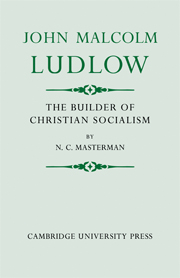Book contents
- Frontmatter
- Contents
- Acknowledgements
- INTRODUCTION
- I THE PARISIAN SCHOOLBOY
- II THE STRANGE YOUNG LAWYER
- III THE FRATERNAL CHRISTIAN
- IV FRENCH SOCIALISM FOR ENGLISH CHARTISTS
- V THE STATESMAN OF CO-OPERATION
- VI THE PRODUCER'S THEORETICIAN
- VII A PROPHET OUT-PROPHESIED?
- VIII REVIEWER AND EDUCATIONALIST
- IX THE DEMOCRATIC IMPERIALIST
- X THE MENTOR OF GERMANS
- XI LEGISLATOR AND CIVIL SERVANT
- XII THE CRITICAL UNIONIST
- Conclusion: LUDLOW'S ACHIEVEMENT
- Appendix: LUDLOW ON THE JUNTA
- Notes
- Bibliography
- Index
V - THE STATESMAN OF CO-OPERATION
Published online by Cambridge University Press: 07 October 2011
- Frontmatter
- Contents
- Acknowledgements
- INTRODUCTION
- I THE PARISIAN SCHOOLBOY
- II THE STRANGE YOUNG LAWYER
- III THE FRATERNAL CHRISTIAN
- IV FRENCH SOCIALISM FOR ENGLISH CHARTISTS
- V THE STATESMAN OF CO-OPERATION
- VI THE PRODUCER'S THEORETICIAN
- VII A PROPHET OUT-PROPHESIED?
- VIII REVIEWER AND EDUCATIONALIST
- IX THE DEMOCRATIC IMPERIALIST
- X THE MENTOR OF GERMANS
- XI LEGISLATOR AND CIVIL SERVANT
- XII THE CRITICAL UNIONIST
- Conclusion: LUDLOW'S ACHIEVEMENT
- Appendix: LUDLOW ON THE JUNTA
- Notes
- Bibliography
- Index
Summary
It was no mean achievement of Ludlow and his friends to launch, in all, some twelve co-operative workshops (three tailors', two builders', three shoemakers', one piano makers', one printers', one bakers', one smiths'). Sprinkled as they were over London, in Tottenham Court Road, in Vauxhall Bridge Road, in Red Lion Square and in Pimlico, among other places, and publicised by tracts and articles, they could not be ignored. As Ludlow had foreseen, their co-operative and democratic character challenged on its own ground the world of autocratic radical captains of industry and the popular political economy which seemed to represent the world of the future. Appearing at a time when continental revolution and counter-revolution had set people's nerves on edge, they produced a reaction out of all proportion to their actual size and significance. Those who perhaps realised that the Christian Socialists' associations exposed their own selfish philosophy became very angry, especially at the propaganda Ludlow and his friends wrote to support their practical efforts. ‘Tracts full of disreputable rant; mouthpieces of class selfishness, popular prejudice and ignorant passion; ravings of blasphemy; mischievous provocations clothed in oily phrases of peace and charity’; such were some of the phrases hurled by the press against Ludlow and his fellow workers at the time, while it was difficult to persuade any bookseller to display their pamphlets or advertise the wares of their workshops.
- Type
- Chapter
- Information
- John Malcolm LudlowThe Builder of Christian Socialism, pp. 95 - 113Publisher: Cambridge University PressPrint publication year: 1963



